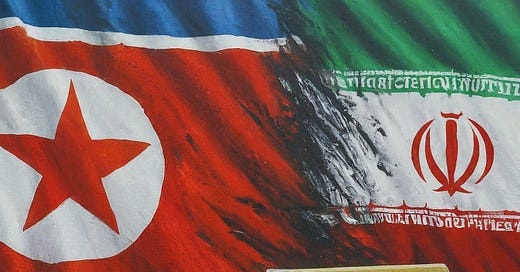US intel community threat assessment on NK and Iran; BRICS has AML council; Panama’s flags of convenience for Iranian vessels
Prohibited Transactions for the week of 11 Mar 2024 (#40)
North Korea
The US intelligence community’s 2024 Annual Threat Assessment states that North Korean leader Kim Jong-un has “no intentions of negotiating away his nuclear program” and will increasing engage in illicit activity such as evading international sanctions and cyber theft to fund priorities such as the DPRK’s weapons of mass destruction (WMD) programs. This includes continuing to build a more capable missile force by importing dual-use goods in violation of international sanctions, primarily from the PRC and Russia. The report also noted:
North Korea will continue its ongoing cyber campaign, particularly cryptocurrency heists; seek a broad variety of approaches to launder and cash out stolen cryptocurrency; and maintain a program of IT workers serving abroad to earn additional funds.
//Kim will require large amounts of money to maintain his desired military posture, as well as to ensure the continued loyalty of the Pyongyang elites. Their attacks will likely get more sophisticated as they continue to probe for weaknesses in traditional and decentralized finance.
North Korea recently sent delegations to Brazil, Kenya and Mongolia in an effort to break out of its diplomatic isolation. //This may in part be a reaction to the establishment of relations between Seoul and longtime North Korean ally Havana. However, this push also comes on the heels of the DPRK closing down a number of embassies around the world (see Issue #29)
--
A North Korean cargo vessel know for coal smuggling docked at a Russian port last week, raising concerns that it may be violating sanctions.
A US district court ordered the forfeiture of 145 digital currency accounts containing funds tied to North Korean hacks.
In a review of materials published between December 2016 and September 2023 from a database of peer-reviewed literature, reporters found at least 110 research papers co-authored by North Koreans which may violate international sanctions. These papers covered topics including missiles, and other military technologies.
Iran
The US intelligence community’s 2024 Annual Threat Assessment states that Iran will continue to support its “partners and proxies around the Middle East, including Lebanese Hizballah, the Huthis, and Iranian backed militias in Iraq and Syria,” though Tehran’s continued backing of HAMAS could weaken the country’s attempts to entice foreign investment. Slowing growth in the PRC — Iran’s largest buyer of oil — will likely result in weakened oil export revenues. The country is also facing high inflation and a deprecating currency, along with continued sanctions pressure. //Though Iran’s leadership always likes to blame sanctions for the country’s domestic economic woes, corruption and mismanagement of the economy hasn’t helped.
According to an Iranian official, the BRICS group of nations established a Council for Combatting Money Laundering three months ago, and has already convened three meetings to discuss establishing the secretariat and cooperation on a campaign against money laundering and terrorism financing. //The establishment of this anti-money laundering organization (see Issue #39) will likely be used to attempt to discredit the work of the Financial Action Task Force (FATF), which continues to list Iran as a “High-Risk Jurisdiction” subject to countermeasures. The Council could also become a mechanism for some participating nations — such as Iran, Russia and the PRC — to coordinate countersanctions against Western nations.
--
According to Iran’s oil minister, sanctions have not stopped the country’s oil industry, which is able to “export oil to wherever we want.”
An Iranian official states the country is self-sufficient in manufacturing spare parts for airplanes, and could even provide support to other nations under sanctions and in need of spare parts. //Even if this is really the case, Iran still needs actual flyable planes (see Issues #2, #7 and #39) to put these spare parts to good use.
As Venezuela faces the reimposition of US sanctions on its oil industry in April, it’s attempting to make up oil swaps owed to Iran, but which Caracas had neglected when they could sell oil to cash paying customers.
The US government requested that Panama stop providing flags of convenience to Iranian vessels, which is a method used to evade sanctions. According to a US official, at least six vessels flying a Panamanian flag have violated sanctions since January.
Iraq received a sanctions waiver from the US to continue to purchase electricity and natural gas from Iran. Approximately USD10 billion in Iranian money is being held in escrow in Iraqi banks, with a portion of the funds available for transfer to accounts in Oman for purchase by Iran of non-sanctioned goods (see Issue #14).
Bank Melli Iran has been given permission by the Central Bank of Iraq to resume operations in country, following the revoking of their license in January due to its limited activities and inclusion in international sanctions.
Iran’s finance minister says that foreign investments in Iran — due to economic diplomacy, as well as Tehran’s inclusion into the Shanghai Cooperation Organization (SCO) and BRICS group of nations — continues to increase, and may even reach USD5 billion by the end of the year.
Iran and Afghanistan signed a joint cooperation document to strengthen transit corridors between the two countries.
Iran and Türkiye are discussing the potential of launching a joint free trade-industrial zone.



